- Home
- Jessie Haas
Chase Page 6
Chase Read online
Page 6
Oh, but a drink, though. He lay through the night in the endlessly rocking railcar, half dreaming of her washtub and the slosh of soapy water.
It was nearly dawn when they stopped next. The square of light on the wall was pearly gray and there was a smell of dew and grass. Half awake, Phin heard Plume ask, “Where’s this?” Unsteady, abrupt; he must have been drinking all night. Someone answered—a word Phin didn’t hear—and Plume jumped out, falling, swearing.
Fraser asked how long the stop was. “Twenty minutes,” was the answer, and he bought someone’s assistance in laying the ramp.
Phin listened to it thud into place. His tongue was thick and cottony, and so was his head. The back of his throat hurt. When he swallowed, it felt like it was going to break open, like a half-healed wound.
Saddle leather creaked. The stallion’s hooves rang on the wood floor, the sound diminishing down the ramp. Some distance away Fraser said, “All right then, lad.” Next came the tremendous gush of the stallion urinating.
Phin sat up. Where were they?
The stallion clip-clopped away toward the front of the train. Plume was—where? There were voices, but not close.
This was his chance.
He rose on hands and feet and scrambled across the crates, let himself down over the edge, groping for finger-holds and toeholds. An overhead searcher thumped onto the car and walked along it. Phin must be very quick, very good, as he had planned—drop and crawl under the car, and come out the other side running.
His toes touched the floor. He eased down soundlessly and turned.
In the back corner stood a wooden tub, a third full of water.
Phin didn’t think. He was past thinking. He crossed the car in two long steps, dropped to his knees, and plunged his face in.
Beautiful, the wet, the cool. He sucked it in. Bits of hay floated against his lips. He smelled horse and wet spicy oak wood and he drank it down and down, rested, and drank again.
Enough. That’s what he’d have told a thirsty horse. Stop, or you’ll get sick. He glanced toward the door. The rail yard was a wide expanse of gravel seamed with track. Once Phin was out there, he’d be exposed. Good thing it was still so dark.
A bottle lay on the floor, gleaming in the pale light.
A bottle. He could fill it.
It was very near the door, and as he took a cautious step toward it Phin discovered he was afraid; afraid of the light, gray and grainy as it was. Afraid of the open space, and the voices, and the hoofbeats.
He made himself dart forward anyway and snatch the bottle up. No cork; he couldn’t hunt for it, and some of the water would slosh out, but most would stay in, for a while anyway. He pushed the bottle under the surface and jumped at the glugging sound it made. Hurry, hurry. He pulled it out, dripping, before it was full, and turned.
Plume was coming.
For an endless moment Phin stood frozen as Plume crossed the tracks, head down, watching his feet. His miner’s cap was pulled low over his eyes.
He tripped. Phin dived for the shadows, closed his teeth around the top of the bottle, and scrambled up the crate wall. Water sloshed into his mouth, nearly choking him. Up and over and back, light on hands and feet, and into his corner. Plume got back in, then Fraser and the stallion, and the now-familiar departure noises began.
He’d missed his chance.
Well, he had water now, and if they were searching this train on Ned Plume’s orders, then he wasn’t out of coal country yet. Maybe it was all for the best. Phin took a sip of the whiskey-tainted water. A drop went down the wrong pipe and he coughed.
Just once. He stifled the next in the crook of his elbow. Tears streamed down his face, his nose ran, his ribs heaved spasmodically, but he held the coughs inside him.
“Aye,” Fraser said soothingly. “Walk a bit more, lad, if that’s how you feel.” Hooves banged on the floor, providentially making a cover of sound. Phin let out one more cough—he had to or burst—and the train began to wheeze and whisper, hiding his own wheezes. He sat up, weak and wet faced, and saw a small clothy hump on top of the crate a few feet away.
The sack. Dennis’s sack. It hadn’t fallen in the hole after all. When the train sounds had risen to a safe level, Phin crawled over on his stomach, drew it back to his corner, and opened it.
Apples, bruised and cornery, with a lovely scent rising from them. A chunk of the good brown bread the boardinghouse cook made. At the bottom, a small Barlow knife. Its blade was worn almost to a sickle shape; Dennis used it for everything from harness repairs to carving off chunks of tobacco to paring hooves.
Phin’s eyes smarted. He stretched them wide.
Well.
Well.
He had a knife now. What a man needed—a knife to cut his tobacco with.
12
OUT
Sunrise struck wavering red rays through the partly open door. The back wall of the car flashed bright and honey colored, rippling with the shadows of trees they passed. Sheltered in train noise, Phin stretched, peed down a crack behind the crates, ate an apple, all in spacious golden daylight.
There were two stops that morning. Both times Plume got out, once Fraser and the horse did, but Phin never saw another chance to escape unseen.
At the third stop the searchers hauled someone to Plume near the car, someone who spoke quick and stammering in a language Phin had never heard.
“Does that look like a boy?” Plume hit the man—at least, somebody hit somebody. Phin heard the smack and a grunt from Fraser, who must be watching out the open door. A few minutes later Plume got back in and a cork popped.
After this they traveled a long time without stopping. The car heated. Dark drips appeared on the ceiling. Phin touched one, and his fingers came away sticky with tar. He heard the sound of splashing a couple of times—Fraser putting water on the horse to cool him.
That would feel good, but Phin didn’t have water to waste. Not enough to last the day, truth be told.
He ate another apple and his last biscuit; recited poetry under his breath, reaching back to the distant past—yesterday morning—when he’d been himself, when his life was recognizable. Train rhythm became washboard rhythm, and he could imagine his mother was there. But not for long.
At last he took out the roll of money.
His hands jumped when he saw the printed numbers. He’d never held one bill of this size, let alone—he rifled through them—four, five, six, se—no, that was a folded piece of paper.
Did he have it, then? He’d been sure that whatever it was had been left under Dennis’s stairs. He started to unfold it.
His hands shook.
That stopped him. He sat for a while staring at the folded sheet. The letters might as well be Chinese—upside down, backward, bleeding through the cheap paper. What could it be? A letter? Orders? Worth the lives of six men—Sleepers? Intended victims? Maybe also the life of one boy, if he made the right bargain.
In which case he should read it.
Or he shouldn’t.
He already knew more about the Sleepers than most people, growing up at Murray’s. But what he knew was put together from shreds that wouldn’t seem like evidence to anyone else. Shreds were safe. Shreds could be denied. This—
He folded the bills around the paper, stuffed the roll into his pocket. Think about this. He already knew one thing he couldn’t forget. Maybe he’d better keep it that way.
The paper made him think of Margaret. After his mother’s death she’d taken him on, watched over him in her way. It used to embarrass Phin, being singled out by her with men like Plume watching. She’d known that. It amused her. She’s no fool, his mother used to say, and now he wondered: had her attention saved his life? Was that why Plume hadn’t shot him?
Saved him only to doom him twenty minutes later.
Plume spoke abruptly; Phin adjusted his ears to catch him mid-sentence: “—unnerstand is killin’.”
His voice was slurred and struggling; a man at the head-
on-table stage, driven to tell all he knew before oblivion took hold. “All through the strike—‘don’ do nothin’, no violence,’ they said. An’ we held our fire. An’ what happened? They broke the union, an’ now we’ve…got…nothin’.”
Phin touched the money in his pocket. Not exactly. But many did have nothing. All summer families had scoured the woods for mushrooms and berries, leaving the land bare and beaten seeming. After that, the sound of the breaker had meant defeat, but also life.
“You’re working again,” Fraser said.
“Twenty-six percent pay cut! An’ they’re closin’ shafts. Every—every job they cut…b’longs to an Irish. Tell me that’s right. Tell a kid he can’t eat tonight ’cause Pop came from…from Ireland. He don’t care! He’s a kid; he’s here. Wants to eat. So what are you going to do? Let it keep on like that?”
“No,” Fraser said after a bit. “Got to fight, I guess. But who? It’s not just one man—it’s a kingdom.”
“Machine,” Plume said. “Put in an Irishman, turn the crank. Out drops a dollar. So who—who d’you fight? You fight—everybody. Fight the whole—whole place. Startin’…with…that kid.”
“He’s just a kid,” Fraser said. “He’s here.”
Phin’s heart skipped in his throat. He drew his legs under him, ready to dive out the door—
“Wants to eat,” Fraser went on, and Phin realized he was quoting Plume’s words back to him, pulling the cat’s tail again. Next would come the quarrel, then the soothing.
But there was no response. After a while Fraser said, “Sweet dreams, pal! And now what?”
There was a restless note in his voice. The stallion got up with a thump and scrape. “Nay then,” Fraser said. “Let’s think a bit.”
Phin leaned back in his corner. He felt more uneasy with Plume unconscious than he had with both enemies wide awake. Plume and Fraser had canceled each other out. Now there was only Fraser—whoever he was. Whatever he wanted.
Get off now, the train seemed to say. Get off now getoffnowgetoffnow. Phin sat rubbing his leg muscles back to life, listening for the sounds that Fraser persistently did not make.
A long time later the train stopped again.
The stallion rose, impatient, quick moving. “Nay, don’t step on him.” There was a dragging sound. “Now, what am I going to do with you?” Fraser said. “What am I going to do at all?”
Get out, Phin thought. Because I am! He rose, half crouching under the low ceiling, and tucked the flour sack into his belt. Without a cork the bottle wasn’t worth taking, but the sack would come in handy.
With the train still, the sound cover was gone. Phin only moved when the stallion did. Fortunately the animal was as restless as he was. Soon Phin was far enough forward to see Fraser at the open door, staring at—
What? Phin could see nothing but green and shadows. He had the impression of late afternoon, smelled apples and fresh pine sawdust. A breeze whirled the hay chaff into the air and the sun caught it, turning it to shifting golden needles.
Fraser sighed.
There was a second sigh, and Phin realized with a terrible start that the stallion had raised his head. The brilliant dark eyes were fixed on him.
The stallion lifted his head minutely, lowered it, lifted again, as if sampling separate layers of air current. His nostrils flared, red as glowing coals. The sharp-cut ears focused on Phin for a long moment. Then one slanted at the man in the doorway.
Phin almost put a finger to his lips. Don’t, he mouthed, knowing that was ridiculous. He was mesmerized by the movement in the delicate skin above the nostrils. It seemed to purl like flowing water or like smoke. He knew he should sink back out of sight, but he couldn’t, didn’t, until he heard footsteps outside. Then he crouched, turning his face away.
“What’s all this?” someone said at the door. “Why are you riding here?”
Fraser said, “It’s all right.”
“All right? This car’s supposed to be half empty. There’s supposed to be room for a shipment of furniture.” The man wasn’t noticeably Irish; Phin wondered where they were.
“It’s all right,” Fraser repeated. “I have this.”
“What about him?” the voice said a moment later, grudgingly.
“He’s traveling with me,” Fraser said. “Know who this is? You’re lookin’ at Ned Plume.”
“Never heard of him.”
“A lot of people have. If you know what I mean.”
“I don’t,” the man outside said firmly. “Never been mixed up in any of that.”
“Whatever it is,” said a second voice. Phin hadn’t realized there were two of them.
“Don’t be a fool!” the first man snapped. He crunched away.
“This’ll be a long wait,” the second man said. “She’ll be taking on water when we’re cleared to pull in.”
“How long?”
“An hour. Maybe two.”
Fraser said, “Then we’ll get out for a bit.”
“Too steep for the ramp, I’m thinkin’.”
“He’ll jump.”
“And back in? I’ll admire to see that. He’s a fine Morgan.”
“No.” Fraser sounded occupied; saddling, likely. “Caught him wild on the northern plains—”
“That’s a Morgan,” the trainman said flatly. “Stood the trip well, hasn’t he? Just a little nervous-like. Now what about him?”
The saddlebags slapped into place. “Sick,” Fraser said. “Contracted it from the neck of a bottle! Is there a doctor in town?”
“There is—white house next to the store. Got a little of the same sickness, from what I hear.”
“Then maybe he knows the cure. I’ll ride up and see if he’ll take my friend in charge.” Leather creaked as Fraser mounted.
Phin curled tight, arms around his knees. His heart beat so loudly he thought Fraser must hear it. Why hadn’t he waited? Just a few minutes, and he would have been able to leave safely, but he’d been impatient and now Fraser’s head was level with the stallion’s. All he had to do was turn his head—
“Stand back!” Fraser said. There was a scraping sound, the crunch of gravel, then a sudden sense of air and emptiness in the car and a drumbeat of hooves outside, rapidly receding. The trainman whistled. “Look at him go!”
Then the voice spoke through the open door: “In a bad way, ain’t you? Wouldn’t want to have your head right now!”
Phin hunched, holding his breath, until the man walked away. Then he scrambled across the crates.
Plume was down there. Phin could see his boots pointing slackly toward the ceiling. But there’d been no sound from him. Passed out, Phin hoped. Anyway there was no choice. He let himself rapidly down.
Plume lay boneless against a pillow of hay, his face pale and slick with sweat. He seemed unable to move, but his eyes followed Phin, dark, narrow, and filled with hate.
13
PURSUIT
He’d never been hated before. He was never important enough to hate. The look almost stopped him; but then Plume tried to move and Phin was out the door.
Bright, so bright. Blinking, he made out a fat man in overalls stumped away up track. Beyond him the world blurred red, scarlet, and orange—trees in their fall colors. A distant gray steeple floated above them, transparent against the blue sky.
Plume groaned and scuffed the floor, trying to get up; Phin ducked between cars to the other side of the train, where a green meadow sloped up to a bright wood. He jumped down the railroad grade and ran.
It felt effortless. His long afternoon shadow raced ahead of him up the grass. Insects leaped wildly out of his way. A crow squawked and angled off into the sky.
But the steep hill quickly sapped his strength. He stumbled in an unseen swale and almost fell. Watch out! Holes.
No, this wasn’t coal country. Was it? Chest heaving, he turned to look back.
A landscape of fields, farms, stone walls spread before him. Patches of colorful woodland were thrown over the k
nees of the hills like quilts. No breaker buildings loomed. No scars of digging or heaps of mine waste marred the earth. The train was the only industrial thing in sight, tended by little figures of men up near the engine. A lady’s bonnet poked out a window of the passenger car like a daisy.
Phin walked on. His legs felt weak, his head throbbed, train noise echoed in his skull—but he was someplace else, someplace new. Birds. Treetops sighing in the wind. Whisper of falling leaves.
No tavern talk. No breaker. No explosions underground. The air was fresh and spicy, like the stray breeze that morning at Engelbreit’s.
He stepped into the shadow of the woods and turned to look back. A tiny horse and rider and a miniature buggy came from the direction of the steeple. Fraser’d found his doctor.
Would Plume mention having seen him? Would he even remember? He was in very bad shape—but a man like Plume couldn’t be counted out until he lay dead in his grave.
Phin drove himself uphill toward the setting sun. Walking eased the ache in his bones. The fresh breeze carried away the leftover heat of the boxcar and brought a promise of chill. He was thirsty, hungry, and he needed shelter before nightfall. Still, a weight seemed lifted from him. He was out of the boxcar, alone and free.
The trees thinned to open meadow, brown with dry goldenrod. An abandoned farmhouse overlooked it, sway-backed, with glass-less windows. Its dark weathered siding blended with the woods above. Toiling up the slope, Phin found the remnants of a fallen barn, some rotted fence rails, a stone pen—
And at last, what he was looking for. Behind the barn, a tiny stream trickled from a stone pipe in the hillside, dropping musically into a mossy wooden trough. Small, nearly invisible stick things bent and straightened, bent and straightened, in the depths. Phin cupped his hand under the pipe and collected a palmful. No swimmers. It looked clean and clear and it tasted like—
It tasted like water.
When he’d finally had enough, Phin looked around. Could he stay here? It answered two of his needs, water and shelter.

 Chase
Chase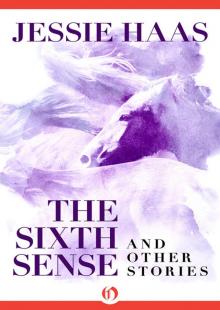 The Sixth Sense
The Sixth Sense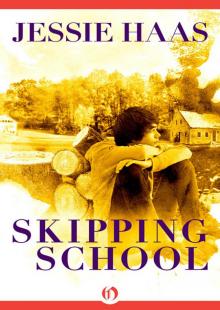 Skipping School
Skipping School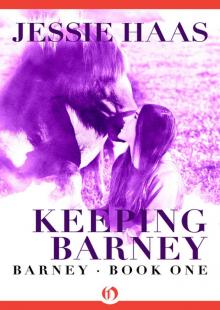 Keeping Barney
Keeping Barney Unbroken
Unbroken Westminster West
Westminster West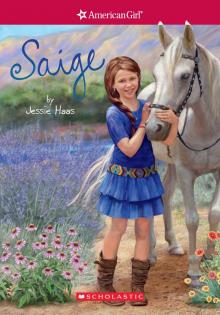 Saige
Saige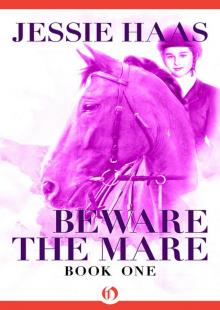 Beware the Mare
Beware the Mare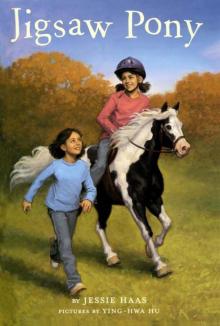 Jigsaw Pony
Jigsaw Pony Rescue
Rescue Saige Paints the Sky
Saige Paints the Sky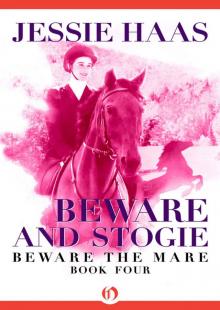 Beware and Stogie
Beware and Stogie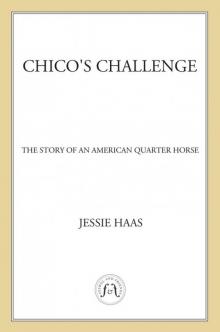 Chico's Challenge
Chico's Challenge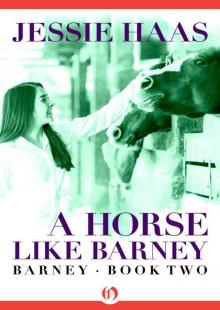 A Horse like Barney
A Horse like Barney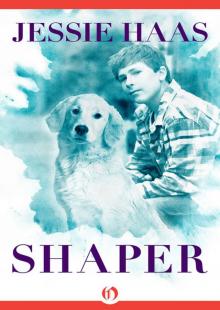 Shaper
Shaper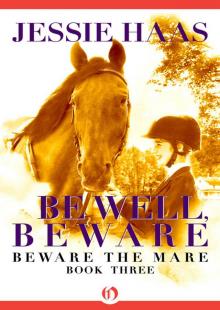 Be Well, Beware
Be Well, Beware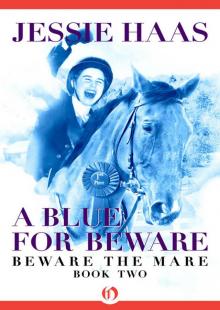 A Blue for Beware
A Blue for Beware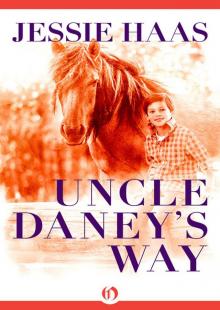 Uncle Daney's Way
Uncle Daney's Way